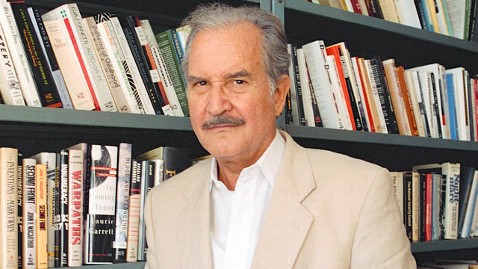Carlos Fuentes, Mexican Novelist Who Inspired Latin American Writing, Dies

(Rick Maiman/AP Photo)
Carlos Fuentes, the Mexican writer whose powerful mix of deep political and social commitment with bold stylistic innovation made him among the most prominent figures in Latin American writing in the 1960s and '70s, has died in a Mexico City hospital. He was 83.
He may be best known in the United States for his 1985 novel "The Old Gringo," about the disappearance of the American writer Ambrose Bierce in Mexico during the revolution. The book became a U.S. bestseller and was made into a movie starring Gregory Peck and Jane Fonda. But it was with his earlier novels that Fuentes made his most profound mark on world literature.
His bold experimentation with narrative voice and the line between reality and imagination put him firmly in company with such writers of his generation as Gabriel Garcia Marquez and Alejo Carpentier, who brought international attention to the writing of Latin America, but Fuentes' voice was more acerbic, more urban, and often more openly political.
Where Garcia Marquez took as his world the Colombian village of Macondo, with its interwoven families and the matter-of-fact miracles that came to be called Magical Realism, Fuentes made Mexico City almost a character itself in his first novel, "Where the Air is Clear."
"The Death of Artemio Cruz" interwove stream-of-consciousness psychological depth with bitter political comment on how the leaders of the Mexican revolution betrayed their ideals and the country.
For all his literary experimentation, Fuentes' work nearly always retained a sharp emotional edge and a clear focus on what he was trying to say. In "Change of Skin," for instance, the second-person narration addressed alternately to two of the characters in the novel is often dizzying, but the technique only heightens the emotional impact of the story of betrayals - both personal and political.
His masterwork may be "Terra Nostra," at least in terms of scope. It is a monumental retelling of the history of Latin America, weaving together fact, fiction, legend and fantasy. Among his other books are "Aura," a novella about possession and sexual desire, and "The Good Conscience," which is among his most straightforward narratives.
Though he was perennial contender for the Nobel prize, he never won. He still received worldwide recognition for his work. "Terra Nostra" received the Venezuelan Romulo Gallegos Prize; in 1987 he won the Cervantes Prize, the Spanish-speaking world's highest literary honor. In 1994 Spain gave him a Prince of Asturias Award for literature. In 1997 he was named a commander of the National Order of Merit, France's highest civilian award given to a foreigner.
He also received the Four Freedoms Award for Freedom of Speech and Expression in 2006, in Middelburg, the Netherlands.
Early in his career his left-leaning politics brought controversy, as when he was barred from the United States under the McCarren-Walter Act for his perceived support for Cuban dictator Fidel Castro. But while he never lost his concern for social justice, his views became more moderate.
He taught courses at Harvard, Princeton, Columbia, the University of Pennsylvania and Brown, and twice served as Mexican ambassador, first to England and then to France. He resigned both posts in protests related to the 1968 slaughter of Mexican students.
Fuentes was born in Panama City on Dec. 11, 1928 to Mexican parents. His parents were both diplomats, so Fuentes moved frequently in his early years, living in Montevideo, Uruguay; Rio de Janeiro; Washington, D.C.; Santiago, Chile; and Buenos Aires, Argentina. He later divided his time between homes in Mexico City home and London, where he did most of his writing.
He married actress Rita Macedo in 1959, and the couple had a daughter, but divorced in 1973. Fuentes was romantically linked to the actresses Jeanne Moreau and Jean Seberg.
Fuentes later married journalist Silvia Lemus and they had two children together. Their son Carlos Fuentes Lemus died from complications associated with hemophilia in 1999, and Natasha Fuentes Lemus died in 2005 after a cardiac arrest.
The Associated Press contributed to this report.